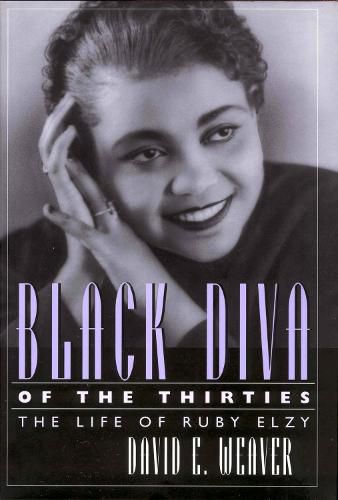Readings Newsletter
Become a Readings Member to make your shopping experience even easier.
Sign in or sign up for free!
You’re not far away from qualifying for FREE standard shipping within Australia
You’ve qualified for FREE standard shipping within Australia
The cart is loading…






This title is printed to order. This book may have been self-published. If so, we cannot guarantee the quality of the content. In the main most books will have gone through the editing process however some may not. We therefore suggest that you be aware of this before ordering this book. If in doubt check either the author or publisher’s details as we are unable to accept any returns unless they are faulty. Please contact us if you have any questions.
While undergoing routine surgery to remove a benign tumor, Ruby Elzy died. She was only thirty-five. Had she lived, she would have been one of the first black artists to appear in grand opera. Although now in the shadows, she was a shining star in her day. She entertained Eleanor Roosevelt in the White House. She was Paul Robeson’s leading lady in the movie version of The Emperor Jones. She co-starred in Birth of the Blues opposite Bing Crosby and Mary Martin. She sang at Harlem’s Apollo Theater and in the Hollywood Bowl. Her remarkable soprano voice was known to millions over the radio. She was personally chosen by George Gershwin to create one of the leading roles in his masterpiece, that of Serena in the original production of Porgy and Bess. Her signature song was the vocally demanding
My Man’s Gone Now.
From obscurity she had risen to great heights. Ruby Pearl Elzy (1908-1943) was born in abject poverty in Pontotoc, Mississippi. Her father abandoned the family when she was five, leaving her mother, a strong, devout woman, to raise four small children. Ruby first sang publicly at the age of four and even in childhood dreamed of a career on the stage. Good fortune struck when a visiting professor, overwhelmed upon hearing her beautiful voice at Rust College in Mississippi, arranged for her to study music at Ohio State University. Later, on a Rosenwald Fellowship, she enrolled at the Juilliard School in New York City. After more than 800 performances in Porgy and Bess, she set her sights on a huge goal, to sing in grand opera. She was at the peak of her form. While she was preparing for her debut in the title role of Verdi’s Aida, tragedy struck.
During her brief career, Ruby Elzy was in the top tier of American sopranos and a precursor who paved a way for Leontyne Price, Jessye Norman, Kathleen Battle, and other black divas of the operatic stage. This biography acknowledges her exceptional talent, recognizes her contribution to American music, and tells her tragic yet inspiring story.
$9.00 standard shipping within Australia
FREE standard shipping within Australia for orders over $100.00
Express & International shipping calculated at checkout
This title is printed to order. This book may have been self-published. If so, we cannot guarantee the quality of the content. In the main most books will have gone through the editing process however some may not. We therefore suggest that you be aware of this before ordering this book. If in doubt check either the author or publisher’s details as we are unable to accept any returns unless they are faulty. Please contact us if you have any questions.
While undergoing routine surgery to remove a benign tumor, Ruby Elzy died. She was only thirty-five. Had she lived, she would have been one of the first black artists to appear in grand opera. Although now in the shadows, she was a shining star in her day. She entertained Eleanor Roosevelt in the White House. She was Paul Robeson’s leading lady in the movie version of The Emperor Jones. She co-starred in Birth of the Blues opposite Bing Crosby and Mary Martin. She sang at Harlem’s Apollo Theater and in the Hollywood Bowl. Her remarkable soprano voice was known to millions over the radio. She was personally chosen by George Gershwin to create one of the leading roles in his masterpiece, that of Serena in the original production of Porgy and Bess. Her signature song was the vocally demanding
My Man’s Gone Now.
From obscurity she had risen to great heights. Ruby Pearl Elzy (1908-1943) was born in abject poverty in Pontotoc, Mississippi. Her father abandoned the family when she was five, leaving her mother, a strong, devout woman, to raise four small children. Ruby first sang publicly at the age of four and even in childhood dreamed of a career on the stage. Good fortune struck when a visiting professor, overwhelmed upon hearing her beautiful voice at Rust College in Mississippi, arranged for her to study music at Ohio State University. Later, on a Rosenwald Fellowship, she enrolled at the Juilliard School in New York City. After more than 800 performances in Porgy and Bess, she set her sights on a huge goal, to sing in grand opera. She was at the peak of her form. While she was preparing for her debut in the title role of Verdi’s Aida, tragedy struck.
During her brief career, Ruby Elzy was in the top tier of American sopranos and a precursor who paved a way for Leontyne Price, Jessye Norman, Kathleen Battle, and other black divas of the operatic stage. This biography acknowledges her exceptional talent, recognizes her contribution to American music, and tells her tragic yet inspiring story.